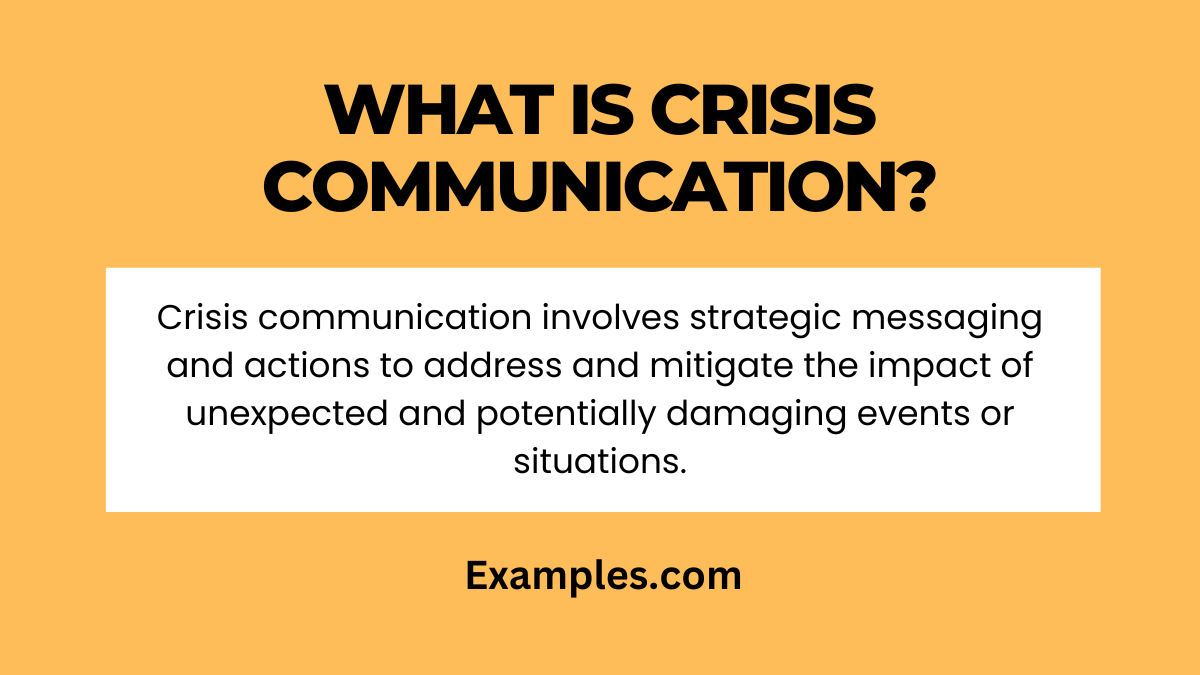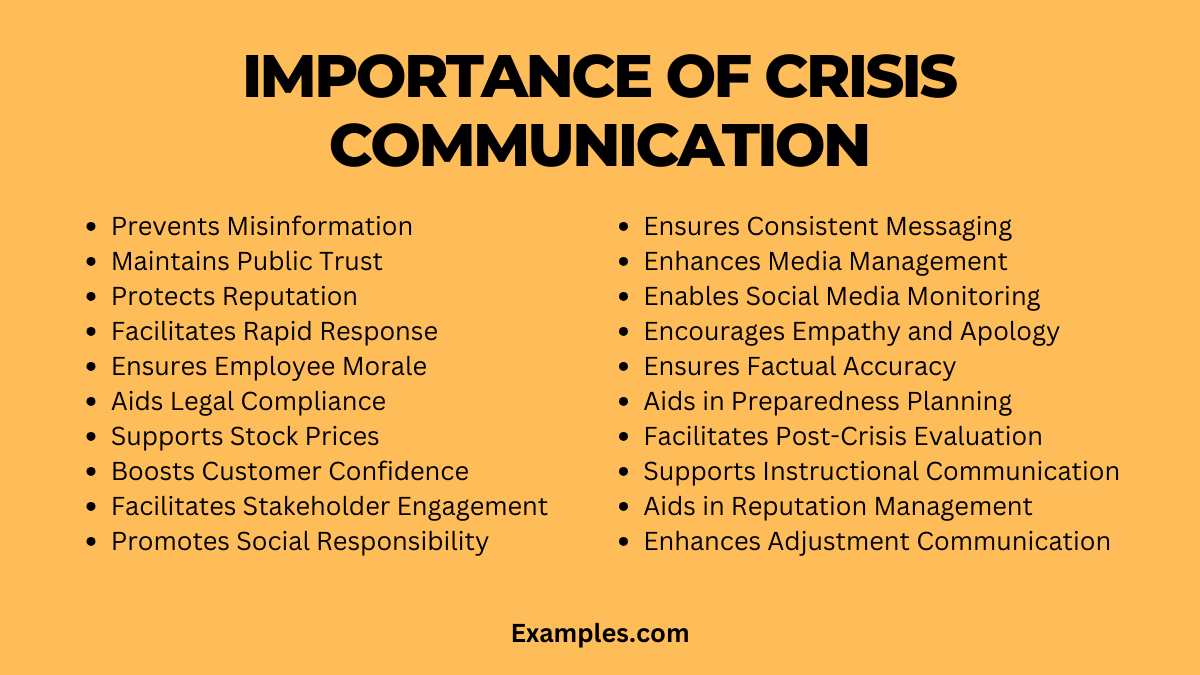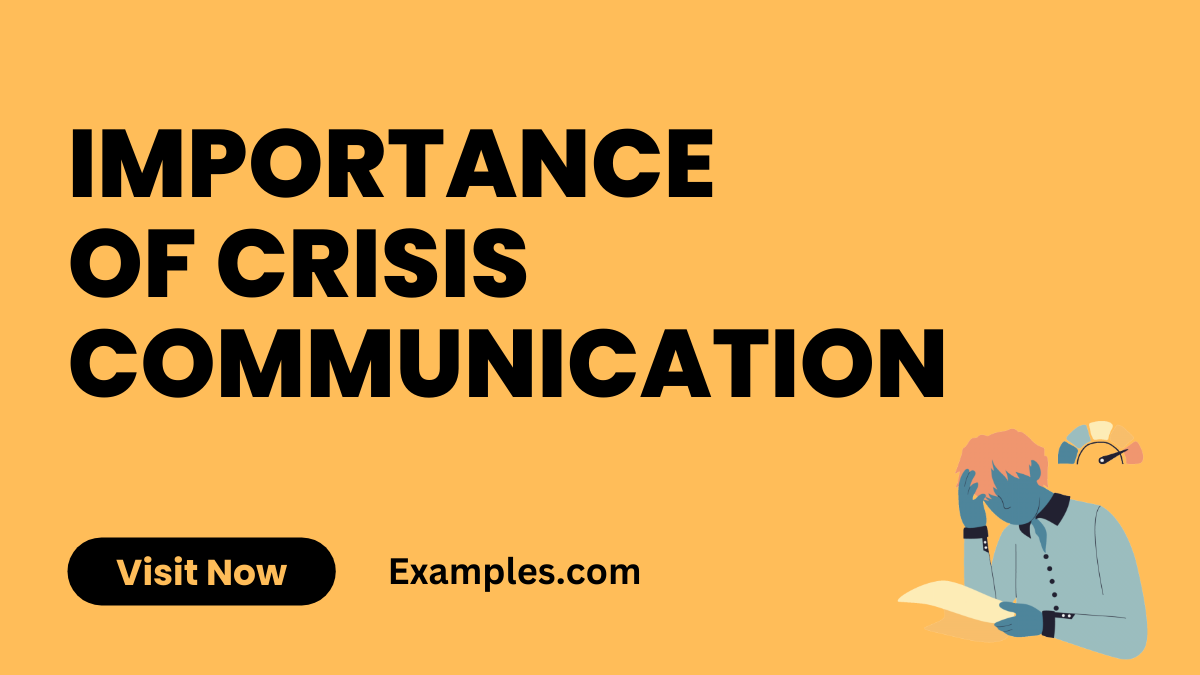19+ Importance of Crisis Communication Examples
In the dynamic world of Crisis communication, understanding the Importance of Crisis Communication is paramount. This comprehensive guide delves into the nuances of effectively managing communication during crises. It highlights not just the strategies but also real-world Crisis Communication Examples, offering a practical approach to this critical aspect of communication. From proactive planning to post-crisis evaluation, this guide covers all facets, equipping readers with the tools to navigate complex situations with confidence and clarity.
What is Crisis Communication?

Crisis Communication is a specialized area of communication focused on the dissemination and management of information during a crisis situation. It involves strategies and practices like Rapid Response in Crisis Communication and Transparent Communication in Crisis Communication to ensure clear, accurate, and timely messaging. This process is crucial in maintaining trust, minimizing harm, and effectively navigating through challenging times.
Importance of Crisis Communication

Crisis communication is crucial in maintaining a positive public image and trust during challenging times. Effective crisis communication can minimize damage, guide the narrative, and rebuild trust. Here are 20 unique examples demonstrating the importance of crisis communication, each with an explanation and example sentences.
1. Prevents Misinformation
In a crisis, misinformation can spread rapidly. By providing accurate and timely information, organizations can counteract rumors and false information. For instance, during a product recall, a company can use crisis communication to provide customers with factual details about the recall and the steps being taken to rectify the issue.
2. Maintains Public Trust
Transparent and consistent communication during a crisis helps maintain public trust. A healthcare organization, for example, should communicate effectively during a health scare to retain the trust of patients and the public.
3. Protects Reputation
Effective crisis communication can protect an organization’s reputation. During a data breach, a company must communicate proactively to reassure stakeholders about the measures taken to secure data.
4. Facilitates Rapid Response
A rapid response is crucial in crisis management. For example, a government agency responding to a natural disaster needs to communicate quickly and efficiently to coordinate rescue efforts.
5. Ensures Employee Morale
Internal crisis communication keeps employees informed, ensuring their morale and productivity remain high. During a corporate restructuring, clear communication about changes and future plans can help maintain employee morale.
6. Aids Legal Compliance
In some crises, timely communication is not just beneficial but legally required. Companies facing legal issues must communicate to comply with laws and regulations.
7. Supports Stock Prices
For publicly traded companies, effective crisis communication can help stabilize stock prices. During a financial downturn, transparent communication about recovery plans can reassure investors.
8. Boosts Customer Confidence
Customers expect reliable information from brands they trust. In a supply chain disruption, a company must communicate with customers about expected delays and solutions.
9. Facilitates Stakeholder Engagement
Engaging stakeholders is crucial for managing a crisis effectively. During an environmental crisis, a company must engage with environmental agencies, local communities, and the media.
10. Promotes Social Responsibility
Organizations need to demonstrate social responsibility during a crisis. For example, during a pandemic, businesses should communicate about safety measures and community support initiatives.
11. Ensures Consistent Messaging
Consistent messaging across all platforms is essential. Inconsistent messages can lead to confusion and mistrust.
12. Enhances Media Management
Effective media management is crucial for conveying the right message. Organizations need to manage media relations proactively to ensure accurate coverage.
13. Enables Social Media Monitoring
Monitoring social media helps organizations gauge public sentiment and respond appropriately. During a public relations crisis, social media monitoring is vital for understanding public perception and responding accordingly.
14. Encourages Empathy and Apology
Showing empathy and, when necessary, issuing an apology can significantly impact public perception. A company admitting fault in a product failure and empathizing with affected customers can maintain customer loyalty.
15. Ensures Factual Accuracy
Providing factually accurate information is critical. Inaccurate information can exacerbate a crisis.
16. Aids in Preparedness Planning
Crisis communication is an integral part of preparedness planning. Organizations with a crisis communication plan can respond more effectively.
17. Facilitates Post-Crisis Evaluation
After a crisis, evaluating the communication efforts is essential to learn and improve future responses.
18. Supports Instructional Communication
Providing clear instructions during a crisis is crucial. For example, during a public safety incident, authorities need to communicate clear instructions to ensure public safety.
19. Aids in Reputation Management
Managing the organization’s reputation during and after a crisis is a key aspect of crisis communication.
20. Enhances Adjustment Communication
Adjusting communication strategies as a crisis evolves is crucial for effective management. In a prolonged crisis, continuous updates and adjustments in communication strategies are necessary.
Importance of Crisis Communication in Business
Crisis communication in business is an essential aspect of organizational management and public relations. It involves the strategies and actions a company takes to communicate effectively during a crisis situation. The importance of crisis communication in business cannot be overstated, as it significantly impacts a company’s reputation, stakeholder trust, and long-term success. Here are eight detailed points emphasizing its importance:
- Maintaining Reputation: In times of crisis, a business’s reputation can be severely impacted. Effective crisis communication helps in managing the narrative, ensuring that the company’s perspective and actions are clearly understood. This minimizes reputational damage and maintains public trust.
- Building Stakeholder Confidence: Transparent and timely communication during a crisis reassures stakeholders, including customers, employees, and investors, that the company is capable of handling the situation effectively. This confidence is crucial for long-term relationships and business continuity.
- Preventing Misinformation: During a crisis, misinformation can spread rapidly. Effective crisis communication ensures that accurate and factual information is provided, countering potential rumors and falsehoods.
- Facilitating Rapid Response: Rapid response in crisis communication is vital. It allows businesses to address issues promptly, minimizing potential harm or escalation of the situation.
- Enhancing Public Safety: In certain crises, especially those involving public health or safety, communicating effectively can directly impact the well-being of individuals. Providing clear, instructional information is crucial.
- Legal and Regulatory Compliance: In some instances, there are legal or regulatory requirements for communication during crises. Adhering to these requirements is essential to avoid legal repercussions and maintain compliance.
- Supporting Post-Crisis Recovery: Effective communication during a crisis lays the groundwork for quicker recovery post-crisis. It helps in rebuilding trust and returning to normal business operations more rapidly.
- Improving Crisis Management Practices: Post-crisis analysis of communication strategies offers valuable insights. Businesses can learn from their experiences, refining their crisis communication strategies for future incidents.
Incorporating these elements into a company’s crisis communication plan ensures a more resilient and prepared organization, capable of handling unexpected challenges with poise and effectiveness.
Importance of Crisis Communication for Employees
Effective crisis communication is crucial in managing unexpected challenges and maintaining organizational integrity. For employees, understanding the significance of crisis communication is essential for several reasons:
- Ensuring Safety and Security: During crises, employees need accurate, timely information to ensure their safety. This includes understanding potential risks and the steps necessary to mitigate these risks.
- Maintaining Morale and Trust: Transparent and honest communication during a crisis helps in sustaining employee morale. It reassures them that the organization is managing the situation effectively and values their wellbeing.
- Promoting Consistent Messaging: Employees often serve as brand ambassadors. Providing them with clear, consistent information enables them to relay accurate messages externally, preserving the organization’s reputation.
- Facilitating Rapid Response: Rapid Response in Crisis Communication ensures that employees are promptly informed about the crisis and the organization’s response, enabling them to adapt quickly to changing situations.
- Enhancing Stakeholder Engagement: Engaging employees as key stakeholders in crisis management fosters a sense of responsibility and inclusivity, encouraging them to actively participate in Crisis Communication Strategies.
- Building Crisis Preparedness: Educating employees about crisis management plans and their roles in these plans cultivates a culture of preparedness, reducing panic and confusion during actual crises.
- Supporting Post-Crisis Recovery: Effective communication aids in the recovery phase, helping employees understand the steps being taken to return to normalcy and what they can do to contribute.
- Encouraging Continuous Learning: Post-crisis evaluations offer valuable insights. Involving employees in these discussions promotes learning from the crisis, leading to improved future responses.
In mastering Crisis Communication, it’s crucial to embrace strategies like Transparent Communication and Rapid Response. These approaches not only mitigate the immediate impact but also play a pivotal role in sustaining long-term trust and reputation. Effective crisis communication transcends mere damage control; it’s an opportunity for organizational growth and learning. By prioritizing transparency and responsiveness, organizations can navigate crises with resilience, maintaining stakeholder trust and emerging stronger in the aftermath.



